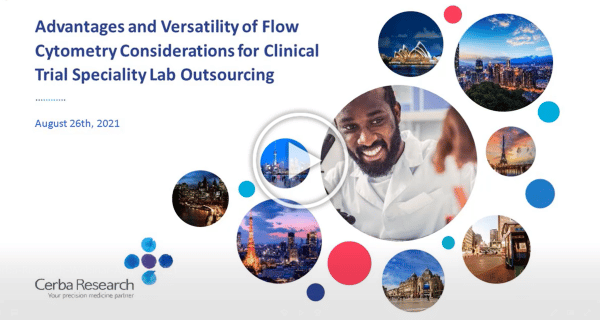Brochure – Cerba Research IHC Biomarkers
Cerba Research offers in-house in situ biomarkers expertise managed by our research scientists, with over 200 optimized IHC and IF protocols, from simplex to multiplex solutions, to suit the needs of any project. The scientific-driven R&D team can provide complete IHC assay development/optimization or assay transfer of clients’ methods and the subsequent fit-for-purpose validation.
Biomarkers can triple drug development success rates when used in clinical research. While scientific and technological advances have led to the discovery of more circulating biomarker candidates, the challenge lies in validating those biomarkers.
Cerba Research takes a personalized approach to biomarker assay development and validation to help clients improve their odds of success. This approach involves the experience of our leading scientists, and our five-continent laboratory network.
Our highly specialized custom assays, innovative anatomical pathology biomarker support, and biomarker strategies de-risk study conduct and generate the data you need to bring new therapies to light. From translational research to clinical through commercialization, Cerba actuates real-world data to help you reach patients and bring clarity to complex research.
Cerba Research provides flexible, tailored biomarker solutions through a network of labs across five continents. When you partner with us, you gain the operational and scientific expertise to advance targeted approaches and broad immune profiling. Together, we will develop biomarker strategies that help your trial succeed.
But which biomarkers can Cerba Research test on? Discover it here in this downloadable brochure.
Click here to download our list of biomarkers
Reach out to our experts and discover how we can help advance your research
Artbook – The Art Of Histopathology
Experience the fascinating world of histopathology through the eyes of our skilled scientists.
Immunohistochemistry (IHC) biomarkers are crucial in clinical development. These tissue biomarkers assist in diagnosis confirmation, patient selection, and mechanistic evaluation.
Our team of IHC experts offers personalized consultations, providing flexible and efficient solutions tailored to your specific needs. We are committed to delivering timely, cost-effective results to achieve your clinical and commercial objectives.
Why Choose Cerba Research For IHC Services?
- Expertise: Our experienced team brings deep scientific knowledge and practical insights.
- Customization: Solutions tailored to fit your unique clinical and commercial needs.
- Efficiency: Flexible, timely, and cost-effective services to streamline your projects.
- Innovation: Cutting-edge techniques to ensure the highest quality results.
Download our digital book to explore the art of histopathology and learn how Cerba Research can support your clinical research goals.
Download Here
Reach out to our experts and see how we can help advance your clinical trial
Webinar – Turning Precision Medicine Into Action in Immuno-Oncology
The challenges in immuno-oncology (I/O) drug development require deep scientific insights, generation and analysis of complex biological data, new state-of-the art technologies and both logistical & operational support across continents. The goal of immuno-oncology drug developers is to turn precision medicine into action, bringing life-changing therapies to patients.
In this webinar our experts discuss the use of Immunohistochemistry (IHC), Next-Generation Sequencing (NGS), and Flow Cytometry (FCM) within immuno-oncology, and how they can offer the comprehensive insights required for I/O clinical trials.
Speakers
- Jérôme Sallette, PhD, CSO Cerba Research
- Shu Jen Chen, PhD, CSO ACT Genomics
- Sofie Vandevyver, PhD, Head of Business Operations & Marketing Cerba Research
- George Wei, PhD, Vice President R&D ACT Genomics
- Renaud Burrer, PhD, Head of Histopathology Cerba Research
- Nithianandan Selliah, PhD, Global Head Flow Cytometry Cerba Research
Reach out to our experts to see how we can help advance your clinical trial
Webinar – Advantages And Versatility Of Flow Cytometry Considerations For Clinical Trial Speciality Lab Outsourcing
It is now clear that the therapeutic future lies in biomarkers through the development of immunotherapies and companion diagnostics. Among the techniques of biomarker analysis, there is Flowcytometry, which allows for precise analysis of liquid samples, but not only.
Validation test development for specific biomarkers is a prerequisite for a successful application in translational research, preclinical and clinical phases. The advantages and disadvantages of this technique, the samples, and the conditions of use: Cerba Research will open the doors of its worldwide laboratories for an hour. To answer all your questions about one of the leading techniques of analysis for the development of innovative treatments, our experts will share their knowledge and experience.
Learning Objectives
- What is Flow Cytometry?
- What is the benefit of this technique?
- How is it implemented in clinical trials?
- Assays management details
Speakers
Nithianandan Selliah, Ph.D., Global Head of Flow Cytometry at Cerba Research
Nithianandan obtained his PhD in Immunology and started to work on HIV research. After more than 10 years of HIV research, he joined a biotech company to work on biomarker discovery for autoimmune diseases. His interest in Flow cytometry at the biotech company led him to join global CRO to work on assay development and validation in Flow cytometry for global clinical trials. He joined Cerba Research to continue to work on his passion for Flow cytometry in clinical trial and takes on new challenges to build the best Flow cytometry service to the clients.
He is working with exceptional scientific teams in the US and Belgium to bring on new assays for various therapeutic indications, including Immuno-oncology and autoimmune diseases.
Ishita Modi, Director, Scientific Customer Solutions at Cerba Research
A microbiologist by education, Ishita finished her studies at Gujarat University in India and moved on to start her career in the United States. She has more than 15 years of experience in the clinical and diagnostic research industry. Her expertise is in building a strong foundation of clinical operations and clinical research with a commitment to meeting client’s scientific needs to help advance medicine. Ishita has worked at CRO/Central Lab as well as at some of the leading clinical diagnostic labs in the region. Her scientific expertise includes infectious diseases and genetics, and gained extensive experience in microbiology, virology, and molecular biology. Ishita is a New York State-certified Medical Technologist and also a certified IRB (Institutional Review Board) professional. Her experience over the years has made her very strong in all aspects of clinical research and regulatory requirements. She has a passion for advancing science and making a difference in the future of healthcare.
Webinar – Advantages and Versatility of Flow Cytometry Considerations for Clinical trial Speciality Lab Outsourcing

Reach out to our experts to see how we can help advance your clinical trial
Webinar – Biomarkers In Immuno-Oncology: Identifying And Implementing Biomarker Testing From Exploratory Research To Clinical Trials
Biomarkers are at the heart of Immuno-Oncology. In this webinar, we will walk you through three case studies to highlight the importance of biomarkers, using different methodologies. Why do some patients respond better to I/O therapeutics than others? What is Flow Cytometry’s role in immunophenotyping? Where does Immunohistochemistry come in? What is the Tumor Mutation Burden, how does it impact I/O research?
Amanda Finan, Head of IHC R&D Cerba Research, Nithianandan Selliah, Global Head of Flow Cytometry Cerba Research, and Raouf Ben Abdelali, Head of the Hematology and Oncology Division, Cerba Laboratory will guide you through their respective fields of expertise and answer the above questions.
Biomarkers in Immuno Oncology: Identifying and Implementing Biomarker Testing
Reach out to our experts and discover how we can help you advance your clinical trial
White Paper – IVDR: How To Prepare For New Regulations And Move Successfully To CE Mark
The new Vitro Diagnostic Regulation legislation comes into force on May 26, 2022. Diagnostic device manufacturers are working hard to ensure design, manufacturing, and post-market surveillance and vigilance of their products comply with the new regulations. As the clock ticks, few manufacturers are fully prepared: according to a survey conducted by MedTech Summit and NSF in early 2021, only 15% of respondent organizations were fully prepared to meet the IVDR deadline.
One of the main reasons for the delay was COVID-19. Almost all (95%) of respondents said the pandemic had impacted their IVDR implementation. While the European Commission recently proposed to adapt the full IVDR mandatory application dates depending on the class of medical device, organizations that are not already working with a Notified Body on CE mark submission may have a tough few years ahead. Download our whitepaper to find out more from Cerba Research.
White Paper – IVDR How to Prepare for New Regulations and Move Successfully to CE Mark
Reach out to our experts to discover how we can help you advance your clinical trial
White Paper – COVID-19 Therapy Development and Clinical Diagnostics – A Clinical Approach To A Multifaceted Evolving Disease
While most people with COVID-19 recover within a few weeks, a notable percentage experience symptoms that last for 12 weeks or longer. With therapy development, we look into clinical diagnostics.
As scientists discover new variants, new questions become more relevant: How will variants impact vaccine efficacy? Who will need booster shots? Will we need new vaccines? Targeting a multifaceted disease such as COVID-19 requires a diverse team of infectious disease experts; it will also require a central lab and clinical diagnostics partner with the expertise and portfolio of testing to serve sponsors’ varied needs.
As the effort to develop more effective COVID-19 treatments and vaccines and protect the global public continues, therapy and vaccine developers must partner with central labs that offer a broad scope of services. A diverse portfolio of exploratory tools and tests is paramount when studying an unpredictable virus.
Find out more about Cerba’s research into COVID-19 by downloading our white paper.
White Paper – Covid 19 Therapy Development And Clinical Diagnostics
Reach out to our experts and discover how we can help you advance your clinical trials
White Paper – Flow Cytometry Advantages In Immunotherapy Clinical Trials
More than three decades ago, scientists at the National Cancer Institute began exploring ways to fight cancer using the patient’s immune system. Their work formed the basis of what is now a promising cancer treatment that doesn’t require surgery or radiation. The global immunotherapy market as well as cell and gene therapy, such as CAR T, adoptive cell therapies, checkpoint inhibitors and other immunotherapies, is expected to grow by 10.1% CAGR between 2020 and 2028.
Patients provide blood samples for clinical trial sponsors to develop and deliver these emerging immunotherapies. Each sample they give is precious, as they all provide a wealth of biological data that contributes to therapy development. To ensure samples arrive at the lab intact, robust sample transportation and global logistics are critical. The deep scientific expertise housed within those labs ensures the highest-quality analysis and reporting.
Our white paper takes an in-depth look at the world of flow cytometry. Nithianandan Selliah, Global Head of Flow Cytometry, and collaborators at Cerba Research, examine its unique benefits and future potential. They highlight the latest trends in technology and set out the key points to consider when planning a flow cytometry-based clinical trial and choosing a partner lab.
White Paper – Flow Cytometry Advantages In Immunotherapy Clinical Trials
Reach out to our experts to discover how we can advance your clinical trial with Flow Cytometry
Case Study – Hemato-Oncology Multiple Myeloma
Discover how our experts helped our sponsor set up a randomized, open-label, multicentre Phase 3 study to compare progression-free survival upon two different combination therapies (with a targeted MoA) in patients with relapsed or refractory multiple myeloma.
See how we were able to handle:
- aggressive study timelines
- frequent changes to the protocol
- the adding CD138+, FISH, and cell clonality added after the study started
- Japan added as a separate study later as well
- the sponsor monitored TAT closely and wanted centralized genomics testing and aggregate reporting.
Click here to download the case study
Reach out and discover how our experts can help advance your clinical trial

